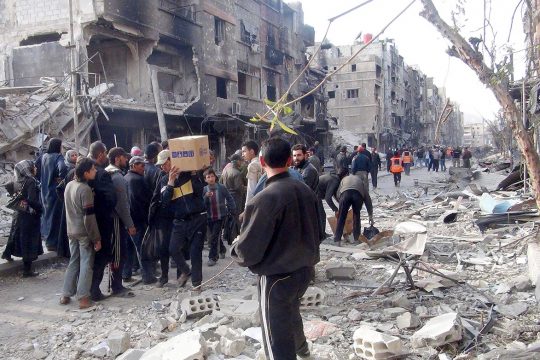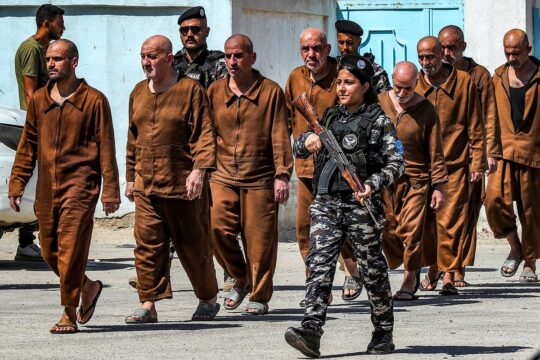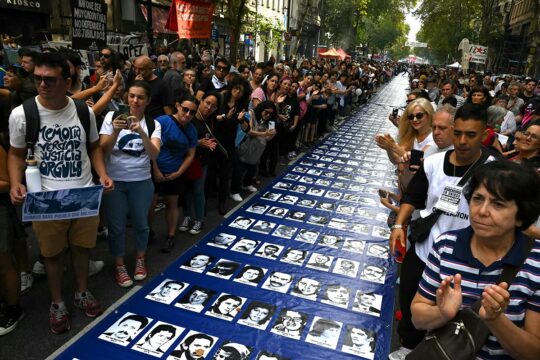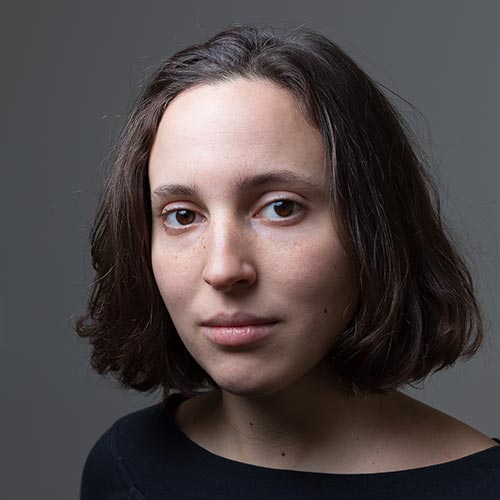On March 23, 2014, was Moafak D. standing in Yarmouk’s main street, firing a rocket-propelled grenade into a crowd of civilians killing at least seven? Or was he lying in a hospital bed, weak and vulnerable, with severe injuries to his leg that would keep him bedridden for days? In their closing statement last Thursday, his defense team in Berlin’s war crimes trial tried to prove the latter.
At the superior Court of Justice in Germany’s capital, a verdict is expected this Thursday at noon. Two weeks ago, the judges had closed the collection of evidence after 30 days of trial, and listened to the prosecutors’ and plaintiffs’ final pleas. Now it was the turn of defense lawyers Michael Böcker and Yorck Fratzky – the same team that had represented Anwar Raslan in Koblenz – to advocate their client’s innocence.
Since August 2022, the Palestinian Syrian Moafak D. has been on trial for war crimes allegedly committed in Yarmouk, a former refugee camp for Palestinians that has turned into a district of Damascus. In March 2014, he allegedly fired a rocket-propelled grenade (RPG) into a crowd of civilians who had gathered to collect UN aid packages. At that time, the mostly Palestinian population of Yarmouk had been suffering from a total embargo since July 2013.
Moafak D. was a member of one of the pro-regime militias that exerted brutal control over Yarmouk, enforcing the siege and tormenting its citizens. He purportedly had a personal motive for the attack: revenge for the death of his nephew, killed in a battle with the Free Syrian Army two days prior.
Defense: no evidential value to eyewitness testimonies
“The defendant has denied committing or participating in the crime, or being present at the crime scene”, said Böcker, adding that no evidence had been able to prove him wrong. He and his colleague called for a complete acquittal of their client.
During the first half hour of the defense plea, Böcker focused on the four witnesses who had identified his client as the perpetrator. The Arab media at the time had decided that Moafak D. was the perpetrator without giving any reasons, he said, and all the witnesses “were subjected to this background noise for years” before they testified. “What, then, is the evidential value of their testimonies?“, he asked. According to his ensuing arguments: zero.
For two of the witnesses, Böcker described stark discrepancies between their initial testimonies with the police and the ones they gave in court. One woman described a completely different weapon to the police than she did to the judges. She originally said that Moafak D. had set down “a basis”, a huge thing that could not be handled by one person, and fired more than 20 shots into the crowd. Later in court, she described a different weapon – an RPG that other witnesses and experts said he used for the attack. It is carried on the shoulder and was only fired once. Another witness also had changed his testimony in terms of the location from which he had observed the crime, added Böcker.
Regarding the two more witnesses who had identified his client, Böcker argued that it was not at all possible for them to have recognized a person from their position a few hundred meters away from the crime scene, especially with the streets as crowded as they described.
At this point, Fratzky took over. He started by reminding the court that before being brought to the federal prosecutor, Moafak D.’s case had been investigated by prominent Syrian lawyer Anwar al-Bunni and his colleagues from the Syrian Center for Legal Studies and Research. Leading figures in the justice efforts by Syrians in Germany, they gathered many of the witnesses who later testified in courts, whether in Koblenz, Frankfurt or Berlin. Fratzky believes that they did not “adhere to the usual standards of interrogation”, when they took those witnesses’ testimonies. He insinuated that some eyewitnesses did not identify alleged perpetrators on their own, but were told about them by the Center. Referring to the Al-Khatib trial in Koblenz, Fratzky argued that “one witness there admitted al-Bunni had shown him a photo of the defendant. Surely, the same thing happened again this time.”
“Their testimonies were not arranged”
Fratzky emphasized that his client, “did not have to prove his innocence. Instead, his guilt has to be proven”, which according to him it had not. On top of that, Moafak D. had been injured at the time of the crimes, said Fratzky. He focused his part of the statement on the alibi that had been brought forward by several of the defendant’s family members who testified in court. The prosecution had described their statements as a “prime example of badly coordinated false testimonies.”
Fratzky begged to differ. He went through their statements arguing why all of them were credible. He said that several had mentioned hearing that Moafak D.’s leg was injured the same day that his nephew was killed – two days before the alleged crimes. This would mean that instead of committing the crimes as revenge for his nephew’s death, the defendant was still in the hospital with injuries that prevented him from walking. None of the witnesses knew when or how exactly he was injured and how long he had to stay in hospital. But according to Fratzky, that lack of exact knowledge “distinctly showed that their testimonies were not arranged.”
One nephew, for example, said that he tried to visit his uncle in hospital, but was not able to find him there, because it was so crowded. “He would not have said that, if his intention had been to provide an alibi”, argued Fratzky. Another nephew, who had testified, said he visited his uncle at home just once after the injury, because he did not get leave from his military service more often. “What would have been the obvious thing to say in a pre-arranged testimony? He would have said that he visited him more often.”
Those who did visit Moafak D. at home were able to give very specific details about what they saw: a badly injured man on a bed, covered with a sheet, with a urine bag attached to his body. “No witness makes up such details”, said Fratzky. “These are the kind of details that get imprinted in someone’s memory when they actually experience them.”
A late alibi
Another important fact for Fratzky was that Moafak D., according to his niece, was not present at his nephew’s funeral. His nephew was allegedly killed two days before the crime, on Mother’s Day. Then the funeral would have been the next day according to Islamic rite, the lawyer said. “If at all possible, D. would have participated in his nephew’s funeral”, said Fratzky – especially seeing that his emotional reaction to his nephew’s death is seen as the motive for the attack two days later. The fact that he did not participate could only be explained by him being in the hospital.
The nephew’s death became a crucial piece of evidence not only for the prosecution who considered it the motive, but also for the defense who used it to argue that it would have been impossible for him to commit the crime. This was corroborated, according to Fratzky, by documents from the hospital presented in court early this year, that state the defendant’s admission on March 21, 2014, and by a medical expert who testified and confirmed that he could have hardly walked with a bullet wound in his foot and a 10cm stitched-up wound on his thigh. “None of the eyewitnesses described a limping person or a shooter with crutches.” However, according to the prosecutor in his final plea, another document suggested that the thigh injury did not happen in March, but in October 2014.
The question remains, why Moafak D. never mentioned his injuries before, neither to the police nor in his two statements in court. In his latest statement in December, he argued that he never set foot in Yarmouk after 2012, when the majority of its inhabitants evacuated after air strikes by the regime. The injury came up in court early this year, when family members of the defendant’s mentioned it. Wouldn’t it have provided a better defense strategy? Böcker explained that his client came from a humble and uneducated background and that “he simply was not aware that it mattered”.








